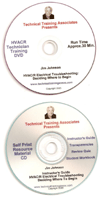These days regular HVACR training is more important than ever. That’s because the HVACR industry seems to change almost daily. The technology to build more efficient, economical, and smarter systems is constantly improving. New regulations by government entities designed to help protect the environment and reduce energy consumption are regularly being imposed. Whether you’re an installer, technician, contractor, or distributor wholesaler, staying abreast of these changes is critically important to your success and your customer’s satisfaction. Continuing education can help you do that, but there are a lot of training programs out there that offer HVACR training. How do you know which ones meet the highest standards of the industry and will give you the confidence in knowing they’re the right courses to help advance your career, improve customer satisfaction, and grow your business? The answer is actually quite simple: accredited training.
WHAT IS ACCREDITATION?
Everyone in the HVACR industry agrees that training is important, but it’s not just training that counts, it’s the quality of training. Unfortunately, not all training programs are created equally. Accredited training is proven to be effective. So, what does accreditation actually mean? Let’s take a closer look.
In general terms, accreditation is the process of officially recognizing that someone is qualified to perform a particular activity. In the case of the HVACR industry, it means that industry experts take a thorough look at schools or facility training programs by examining program elements, such as each instructor’s qualifications, the curriculum being offered, the facility or facilities in which the training occurs, and other industry-relevant criteria. There are a number of organizations responsible for this, including Building Performance Institute Inc. (BPI), HVAC Excellence, North American Technician Excellence (NATE), Partnership for Air Conditioning, Heating and Refrigeration Accreditation (PAHRA), and others. These organizations are supported and recognized by all segments of the HVACR industry and only award accreditation to programs that have met or exceed industry validated standards. For example, PAHRA, which is governed by ACCA, is an independent, third-party organization whose mission is to accredit HVACR training programs by promoting standards developed and validated by the industry trade and education associations. The organization is built on several cornerstones, including the Air-Conditioning, Heating, and Refrigeration Institute (AHRI) curriculum guide and the Industry Competency Exam (ICE).
In order to qualify for PAHRA accreditation, the facility applying must first conduct a rigorous self-evaluation. The self-evaluation compares the training program’s strengths and weaknesses to industry standards. The results are then sent to PAHRA for review. If the review is satisfactory, a survey team is then sent to the facility to conduct an in-depth two-day on-site visit for further evaluation. Once the survey is completed, the information is reviewed and the findings result in accreditation approval or recommended changes that need to be made before approval. The process can be an exhausting effort for the training entity seeking accreditation, but for the learner, it offers the highest level of assurance that the curriculum being studied meets the standards of the HVACR industry, that the instructors are of the highest caliber, and the facility or facilities are fully equipped to provide the right kind of educational tools required to best accommodate the learners.
FOUR REASONS TO CHOOSE ACCREDITED TRAINING
Now that we’ve examined what accreditation is, let’s take a closer look at four reasons why it should be chosen as the best approach to meet your training goals.
When it comes to HVACR training, the most accurate and current information being studied can be critical to the success of a business or the career of an individual. It’s easy to understand why: the industry is changing, especially in four areas.
1) Technology is transforming the HVACR industry — Do you remember when televisions had picture tubes or cellphones weren’t smart? It wasn’t that long ago. Technology today is growing in leaps and bounds. It’s changing the way many industries operate, and it’s the same in HVACR. The HVACR systems of just 10 years ago aren’t the same systems of today. Systems are becoming more efficient and sophisticated while becoming more technologically dependent. Keeping up with the pace of these changes means regular training. Accredited training courses assure learners that they are getting the most current and accurate information possible as well as information that keeps pace with the industry and meets its standards.
2) Government regulations are constantly changing — Government bodies, such as the U.S. Department of Energy (DOE) and U.S. Environmental Protection Agency (EPA), are changing the way the HVACR industry operates. New regulations and mandates affect every area of the industry from manufacturers to installers. Those who don’t keep up with these regulation updates aren’t going to last long in the industry, which is why receiving the most up-to-date training is essential. Training through accredited training programs assures learners of this.
3) Continuing education credits can help advance careers and businesses — Accredited training programs provide learners with continuing education credits that can be transferred or used to help advance careers and businesses. Each credential can help give recipients national credibility, status, and legitimacy in their specialties, giving customers greater confidence in recipients’ abilities and a higher degree of trust and allegiance.
4) Accreditation won’t waste your time or money — Training is an investment of both time and money. Money isn’t earned easily, and time is a resource you can never get back. Why waste either by attending a bogus training center? Accredited training programs promote standards developed and validated by the industry trade, and educational associations help you get the skills, understanding, and confidence to help you excel.
There is no question that ongoing training is important for anyone practicing within the HVACR industry. Finding the right training program that will provide the greatest benefit to your career and/or business is important, but don’t be fooled by bogus programs. Before you invest your time and money in training, make sure the program is recognized within the industry. Only accredited training programs are.
Publication date: 05/23/18











